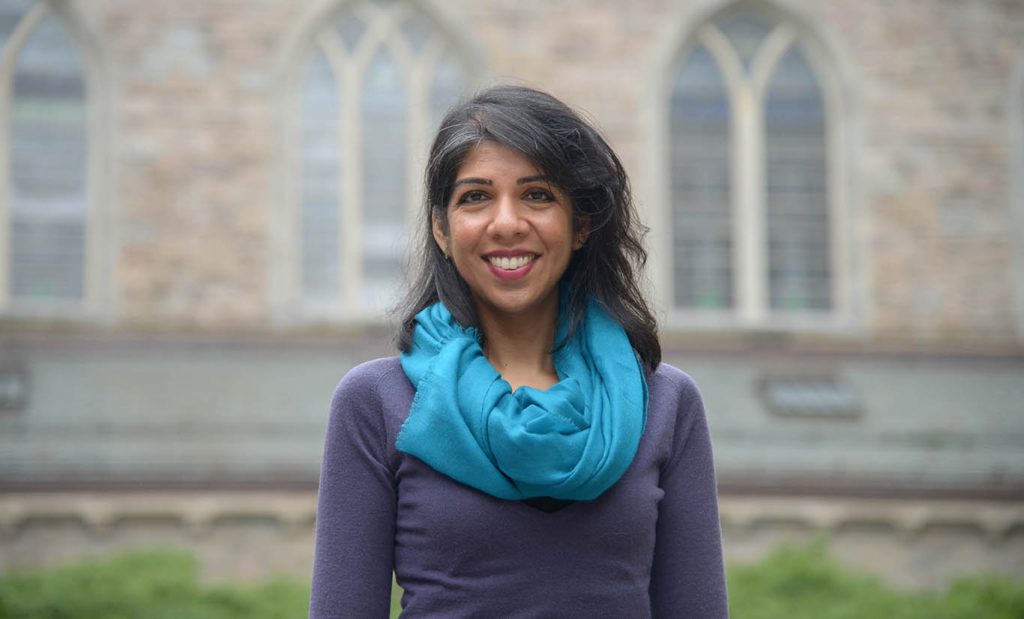On a bookshelf in Anjali Dayal’s office, there is a copy of political scientist James C. Scott’s 1990 book, Domination and the Arts of Resistance: Hidden Transcripts, which explores the relationship between subordinate groups and the political actors who reign over them.
“This was the book that made me excited to study political science,” said Dayal, Ph.D., an assistant professor of political science who began teaching at Fordham in 2015. “It examines one of multiple ways to think about power, which is really what animates the study of political science.”
Dayal hopes her own research, which focuses on international organizations, peace processes, and peacekeeping, will also contribute to new ways of thinking about power.
“We live in a world that has been shaped by big international institutions like the United Nations, European Union, and NATO, which emerged out of the end of World War II,” said Dayal. “These are institutions that were designed to help countries cooperate and work together to secure mutual benefits.”
As the United States’ role in global affairs begins to change—for example, with the country’s recent withdrawal from the Paris climate agreement—political scientists are weighing the short- and long-term effects of the country’s political moves, she said.
“When the United States backs away from international organizations and agreements, we worry it could delegitimize a lot of these institutions,” said Dayal. “If the U.S. says, for example, that it doesn’t need to be a part of an institution like the United Nations, other countries may say, ‘Well, the United States doesn’t think it’s important so why is it important for us?’”
The bargaining models of war
This summer, Dayal is set to complete a manuscript examining the U. N.’s peacekeeping operations. She hopes her analysis of how U.N. peace operations play a role in peace processes might help scholars and policymakers as they reconsider how the United Nations contributes to the way wars around the world end.
“There’s a popular perception that all peace operations don’t work very well, and that’s an understandable reaction because of the way that news is reported,” said Dayal.
Failing U.N. peacekeeping missions in countries and regions such as Rwanda and the Balkans, she said, are more “vivid” in the public eye than more successful peacekeeping missions like those in El Salvador, Guatemala, Sierra Leone, and Liberia—which were not quick fixes.
“What we know from existing academic research is that if combatants have decided to stop fighting, negotiate an agreement, and lay down their arms, then peacekeepers are good at keeping them from picking up their arms again,” said Dayal. “But when we send peacekeepers into active war situations, research tells us statistically it can be the same as not sending them at all.”
Globally, the United Nations is the largest deployer of troops in high conflict regions. Because of this, Dayal said it is important to consider how combatants, who are involved in ongoing peace processes, view the United Nations.
“The United Nations thinks of itself as bringing peace, but the combatants’ view of the United Nations can be very different,” said Dayal. “Combatants think of U.N. involvement as bringing a range of things. It’s possible that it will help bring peace, but even if it doesn’t bring peace, it can bring material and financial benefits, or help create the conditions for humanitarian actors to work on things like refugee resettlement, as well. It can also bring tactical and symbolic benefits, like helping rebels forces recraft themselves as political parties.”
Investigating force in peacekeeping
Dayal said U.N. peacekeeping operations have undergone several changes after some prominent peacekeeping failures in the 1990s. Most recently, she and her co-author Lise Morjé Howard have been researching the U.N. Security Council’s decision to give U.N. peacekeepers authorization to use force in defense of civilians.
In their article, “The Use of Force in U.N. Peacekeeping,” to be published in International Organization journal this fall, they note that the authorization of force doesn’t always fit the peacekeeping mission. She cites the UN Stabilization Mission in Haiti as an example.
“The problem in that case is that Haiti is not at war,” she said. “Who are we protecting civilians from? What’s the peacekeeper’s job there? It’s not clear because the language is identical to the language of giving peacekeepers the authorization to protect civilians in war-stricken places like Darfur or in South Sudan. We think the answer to why the mission mandates all look so similar lies in Security Council politics, not in the conditions on the ground.”
Dayal said her goal in investigating international organizations is to spark conversations among scholars, policymakers and citizens of the world about effective governance and conflict management, so that they can work together to build a better world.
The risks of inaction
One thing that Dayal emphasizes to her students and other young people is that there are risks to inaction on both a national and global level.
Earlier this summer, she was asked to deliver a speech to young women graduating from her old high school in Troy, New York. She encouraged the graduates to be active participants in politics even in moments of despair. An adaptation of that speech was published on Ms. Magazine’s blog.
“It’s important for people to understand that democracy isn’t the kind of thing that you set up once, and it just runs on its own,” she said. “It requires investments from citizens to make sure that their values are expressed in their systems of government.”


